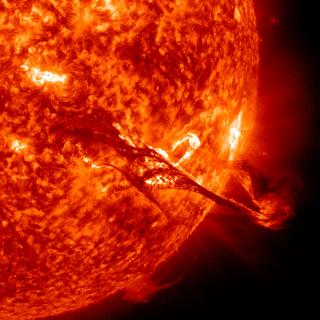Bibcode
Felipe, T.; Braun, D. C.; Birch, A. C.
Bibliographical reference
Astronomy and Astrophysics, Volume 604, id.A126, 9 pp.
Advertised on:
8
2017
Journal
Citations
12
Refereed citations
12
Description
Improving methods for determining the subsurface structure of sunspots
from their seismic signature requires a better understanding of the
interaction of waves with magnetic field concentrations. We aim to
quantify the impact of changes in the internal structure of sunspots on
local helioseismic signals. We have numerically simulated the
propagation of a stochastic wave field through sunspot models with
different properties, accounting for changes in the Wilson depression
between 250 and 550 km and in the photospheric umbral magnetic field
between 1500 and 3500 G. The results show that travel-time shifts at
frequencies above approximately 3.50 mHz (depending on the phase-speed
filter) are insensitive to the magnetic field strength. The travel time
of these waves is determined exclusively by the Wilson depression and
sound-speed perturbation. The travel time of waves with lower
frequencies is affected by the direct effect of the magnetic field,
although photospheric field strengths below 1500 G do not leave a
significant trace on the travel-time measurements. These results could
potentially be used to develop simplified travel-time inversion methods.
Related projects

Numerical Simulation of Astrophysical Processes
Numerical simulation through complex computer codes has been a fundamental tool in physics and technology research for decades. The rapid growth of computing capabilities, coupled with significant advances in numerical mathematics, has made this branch of research accessible to medium-sized research centers, bridging the gap between theoretical and
Daniel Elías
Nóbrega Siverio

Solar and Stellar Magnetism
Magnetic fields are at the base of star formation and stellar structure and evolution. When stars are born, magnetic fields brake the rotation during the collapse of the mollecular cloud. In the end of the life of a star, magnetic fields can play a key role in the form of the strong winds that lead to the last stages of stellar evolution. During
Carlos Cristo
Quintero Noda